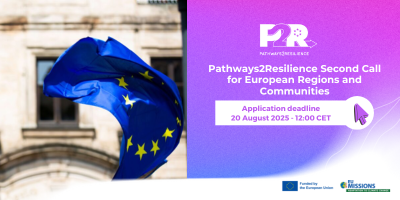What Nature-based-Solutions tell us about linking people to nature
Highlights from the event “Catalysts of Change: Subnational Leadership in the Implementation of Innovative Nature-based Solutions”
Dubai, UAE – On December 6th, an impactful event, “Catalysts of Change: Subnational Leadership in the Implementation of Innovative Nature-based Solutions” took place at COP28 in Dubai, co-organized by Regions4 and the Basque Country government with the support of IUCN. The event brought together subnational leaders and policymakers dedicated to aligning international climate and biodiversity agendas on a territorial scale, addressing dual planetary crises and building a sustainable future for all.
Starting the event, Charles Karangwa, Head for the Nature-based-Solutions (NbS) Management Hub of IUCN, reminded participants about the importance of NbS, not only for climate mitigation and adaptation but rather in an integrated manner and without forgetting other key international agreements such as the Kunming-Montreal Global Biodiversity Framework and the Convention to Combat Desertification. Mr. Karangwa also shared with participants that the IUCN’s Global Standard on Nature-based-Solutions is a clear framework available to help, guide and lead how these solutions can be developed, not only at the national level but also at the subnational and landscape level. NbS require a multi-sectoral approach, and regional governments have a key role in scaling up these solutions, both in urban and rural areas.

The event showcased exemplary initiatives from subnational governments implementing innovative NbS. Representatives from Quebec (Canada), the Basque Country (Spain), Minas Gerais (Brazil), California (United States), Catalonia (Spain), and Baja California Sur (Mexico) shared their experiences.
Basque Country: Pioneering Multi-Sectoral Approaches
Adolfo Uriarte, Natural Heritage and Climate Change Director at the Basque Government called for local and regional-scale nature-based solutions to receive financial recognition and support.
The Basque government, through Ihobe, identified and catalogued 63 projects with approximately 135 nature-based solutions, spanning rivers, coasts, and cities. These initiatives, implemented in municipalities of varying sizes, focus on water purification, renaturalization of waterways, urban greening, biodiversity-connected green belts, and habitat regeneration. Uriarte stressed the importance of diversifying funding sources, involving financial institutions, private initiatives, and the European Union.
Moreover, in a collaborative effort with the Employment Agency, the Basque government has actively employed and trained 30 young individuals. Engaging with local communities, they work closely on local adaptation plans, gaining insights into the opinions of residents and striving for consensus across the entire population. This inclusive approach ensures a nuanced understanding of local perspectives and fosters collective decision-making for the benefit of all.

Minas Gerais: Comprehensive Initiatives for Climate Resilience
Marília Carvalho de Melo, Secretary of State for Environment and Sustainable Development in Minas Gerais, Brazil, underscored the state’s commitment to comprehensive initiatives. An extensive inventory identified over 1 million rural properties, with 94% belonging to small-scale producers. Emphasizing compliance with Brazil’s Forest Code, which mandates conserving 20% of rural property areas, Mrs. Carvalho de Melo highlighted Minas Gerais’ potential to recover an impressive 3.4 million hectares.
In collaboration with the French Government, the state is actively addressing climate change vulnerabilities across its 854 cities. This strategic partnership not only facilitates vulnerability assessments but also empowers the state to assist the most vulnerable cities in formulating robust Climate Action Plans. Moving forward, the next step would be supporting cities in proposing and implementing tailored nature-based solutions that enhance climate change adaptation efforts.

Quebec: Global Contribution to Biodiversity Conservation
Quebec has contributed around 100 million dollars since 2015, first through the GEF and later on through its own International Cooperation Program, for nature conservation in developing countries. In the session, Jean Lemire, Envoy for Climate Change for the government of Quebec, reinforced the need for subnational governments to be part of the decision-making processes and negotiations of international climate and biodiversity funds.
In 2022, in the framework of the CBD COP15, Quebec established a special budget of 650 million dollars for biodiversity. To distribute these funds, the government carried out public consultations and analyzed through the scientific community the best investments for research on how to protect biodiversity in Quebec and how to create species migration corridors. Mr. Lemire highlighted that to find a solution, there is a clear and strong need to work together, include all kinds of knowledge, and invest in nature.
“Being a leader is not deciding everything, but listening to the people, to science, to the indigenous communities and then react”

California: Indigenous-Centric Approach to Nature-Based Solutions
Christina Snider-Ashtari, Tribal Affairs Secretary to the Governor’s office in California, highlighted a pivotal shift in the state’s approach to indigenous peoples since 2019. Addressing historical mistreatment, including mass relocation, dispossession of lands, and redirection for new uses, the Governor issued a formal apology and pledged to implement reparative, restorative, and remedial measures. Subsequently, every state action prioritizes inclusivity, seeking reciprocity by reconnecting indigenous communities with their lands and reintroducing ancestral practices.
The Ancestral Lands Policy stands as a cornerstone initiative, actively promoting the reintroduction of native peoples to their lands, facilitating land transfers, and encouraging engagement in indigenous land practices in all policies and activities. Complementing this, the state embraces the 30×30 commitment and nature-based solutions through Pathways to 30×30, ensuring meaningful engagement and consultations with tribal nations in California.
“If we want to move forward in a way where we are all rowing in the same direction, we have to make sure that all of the native communities and all of the tribal nations are also moving forward with us, and that we are moving forward with them.”
Snider-Ashtari emphasized the collective responsibility of moving forward in unity, ensuring that native communities and tribal nations advance alongside the state. California is actively unravelling legislation to allow native involvement in cultural burning practices, promoting forest health while preventing large, high-intensity burns that have adversely affected the region.
A significant milestone is the Nature-Based Solutions Program, earmarking $100 million exclusively for tribal nature-based solutions. This commitment stems from over a year of consultations with tribal governments, ensuring the program reflects the diverse perspectives of tribal communities. Empowering tribal nations to decide on the land and nature work based on ancestral practices, California’s approach exemplifies a collaborative, inclusive model for sustainable and culturally respectful development.

Catalonia: Positive Policies for Biodiversity Conservation
Marc Vilahur, Director General of Environmental Policies and Natural Heritage for the government of Catalonia, also provided relevant examples of regional action on the synergies between climate and biodiversity. In 2018, Catalonia introduced a Climate Change Law, which establishes a tax on polluting cars. This measure not only propels the transition to electric vehicles but also channels funds directly into natural heritage restoration initiatives. It serves as a compelling example of financial redistribution aimed at enhancing ecological systems and achieving a better equilibrium between humans and nature.
The overarching objective is a shift from hazardous policies to positive and beneficial ones that actively contribute to biodiversity conservation and the fight against climate change. The emphasis lies in implementing actions fostering coexistence between humans and other species and creating synergies for sustainable long-term survival.
The region has a credit carbon compensating system, where the forests found in privately-owned lands have the possibility of requesting money coming from carbon credits from enterprises, in order to carry our conservation and management actions of the area. This is an example of creating synergies that can be maintained long-term.
Furthermore, the Delta of the Ebro, located in Catalonia, faces significant risks due to rising sea levels. The Catalan government has launched a 100-million-euro project aimed at restoring the entire dunes system in the Delta region. Projected for completion in 2027, its goal is to preserve the 25-kilometer coastline through nature-based solutions. However, the presence of dams hinders the necessary sediment flow to the river, presenting an additional challenge to the project, exacerbated by a lack of coordination among involved stakeholders. Efforts to overcome this challenge are crucial to ensure the effective implementation of nature-based solutions and the preservation of the Delta’s delicate ecosystem.

Baja California Sur: Proactive Measures for Environmental Sustainability
Cristina Gonzalez Rubio Sanvicente, Director of Climate Change for the government of Baja California Sur, highlighted the state’s significant efforts over the past two years. They have been dedicated to updating laws and environmental regulations to incorporate criteria and strategies for adapting to and protecting biodiversity. As part of these ongoing initiatives, Baja California Sur collaborated with UK PACT and POLEA to draft a Climate Change Law, which is set for approval by the local congress in the coming days.
In a bid to secure financial support from various channels for addressing climate and biodiversity challenges, Baja California Sur is establishing an environmental fund with the assistance of the German cooperation (GIZ). This fund presents a valuable opportunity for continued action on both fronts.
Furthermore, the state is actively working on the State Ecological Planning, incorporating biodiversity criteria that will serve as the foundation for regional territorial planning. Plans are in place for the implementation of an Air Quality Monitoring Program in 2024, alongside a Climate and Resilience Program at the community level, aimed at reducing the vulnerability of communities and ecosystems. Additionally, a waste management law is in the pipeline, set to be presented to the legal department by the end of this year.
Given its vulnerability to the impacts of climate change, Baja California Sur is leveraging nature-based solutions. These solutions aim to enhance soil and water retention, creating environments that foster local biodiversity in collaboration with the community. The state is taking comprehensive steps to address environmental challenges and promote sustainability across various sectors.

The event demonstrated the pivotal role of subnational leaders in implementing innovative Nature-based Solutions, reinforcing the collective responsibility to address global challenges at the local level. The experiences shared underscored the importance of collaboration, inclusivity, and diverse approaches for a sustainable and prosperous future.

Jordan Harris, Regions4 Executive Director and regional member speakers at the IUCN Pavilion, COP28



